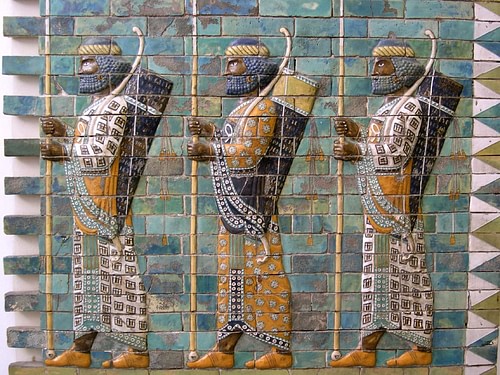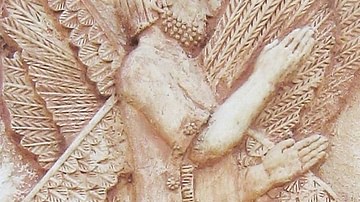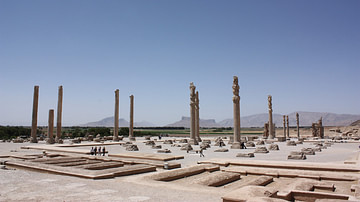Although the Greek historian Herodotus (l. c. 484-425/413 BCE) is often criticized for inaccuracy in his Histories, his frequently-anthologized On the Customs of the Persians is regarded as accurate. The passage is all the more interesting in that he contrasts the behavior and values of the Persians with those of the Greeks, with the Persians shown in a much more flattering light.
His depiction of the Persians here is even more engaging when one considers how he presents the Persian monarchs Cambyses II (r. 530-522 BCE) and Xerxes I (r. 486-465 BCE) as often-irrational tyrants and Darius I (the Great, r. 522-486 BCE) as under the control of his wife elsewhere in his work. Herodotus probably wrote his Histories when the Persian king Artaxerxes I (r. 465-424 BCE) was in power as the work is thought to have been published c. 430-415 BCE.
This is another interesting aspect of the Persian passages as the memory of Xerxes I’s invasion of Greece in 480 BCE would have still been fresh and Artaxerxes I, rejecting direct confrontation, was engaged in subtler means of bringing down the Greek city-states. Even if one assumes that Herodotus knew nothing of Artaxerxes I's various schemes, it would have been no secret that the Persian Achaemenid Empire was no friend of the Greeks at this time. Still, Herodotus consistently presents the Persians in a positive light even though, elsewhere, he clearly allows his personal feeling to color his depiction of an individual or event.
Accuracy of the Passage
In the first chapter (1.131), Herodotus claims the Persians “have no images of the gods, no temples nor altars” and this has been challenged on the grounds that the Zoroastrian religion of the Persians did include temples and altars but, it should be noted, these were by no means like the temples and altars of the Greeks. The rest of his description is entirely accurate as Zoroastrian fire temples were located on “summits of the loftiest mountains” and other high places.
He is also accurate in his description of birthdays as important annual events as the Persians are known to have created the practice of observing birthdays and also of instituting the serving of desserts after a meal (I.133). Although the claim has been challenged, he is also correct in his passage in the same chapter on the Persian love of wine and their policy of making decisions drunk and then reevaluating the same when sober.
The glowing description of the Persians – who, he notes, think it “the most disgraceful thing in the world” to tell a lie (I.138) - is contrasted with the Greeks without Herodotus having to even mention his countrymen. The only time he specifically references the Greeks is in I.135 when he says how the Persians “have learnt unnatural lust from the Greeks.” There would have been no need for him to directly contrast the Persian love of truth with the Greek tendency to prevaricate because his audience would have been well aware of it and this same model holds true for the rest of his description of Persian customs.

The Text
The following passage is taken from Herodotus’ Histories translated by George Rawlinson:
I.131. The customs which I know the Persians to observe are the following: they have no images of the gods, no temples nor altars, and consider the use of them a sign of folly. This comes, I think, from their not believing the gods to have the same nature with men, as the Greeks imagine. Their wont, however, is to ascend the summits of the loftiest mountains, and there to offer sacrifice to Zeus, which is the name they give to the whole circuit of the firmament. They likewise offer to the sun and moon, to the earth, to fire, to water, and to the winds. These are the only gods whose worship has come down to them from ancient times. At a later period, they began the worship of Urania, which they borrowed from the Arabians and Assyrians. Mylitta is the name by which the Assyrians know this goddess, whom the Arabians call Alitta, and the Persians Mitra.
I.132. To these gods the Persians offer sacrifice in the following manner: they raise no altar, light no fire, pour no libations; there is no sound of the flute, no putting on of chaplets, no consecrated barley-cake; but the man who wishes to sacrifice brings his victim to a spot of ground which is pure from pollution, and there calls upon the name of the god to whom he intends to offer. It is usual to have the turban encircled with a wreath, most commonly of myrtle. The sacrificer is not allowed to pray for blessings on himself alone, but he prays for the welfare of the king, and of the whole Persian people, among whom he is of necessity included. He cuts the victim in pieces, and having boiled the flesh, he lays it out upon the tenderest herbage that he can find, trefoil especially. When all is ready, one of the Magi comes forward and chants a hymn, which they say recounts the origin of the gods. It is not lawful to offer sacrifice unless there is a Magus present. After waiting a short time the sacrificer carries the flesh of the victim away with him, and makes whatever use of it he may please.
I.133. Of all the days in the year, the one which they celebrate most is their birthday. It is customary to have the board furnished on that day with an ampler supply than common. The richer Persians cause an ox, a horse, a camel, and an ass to be baked whole and so served up to them: the poorer classes use instead the smaller kinds of cattle. They eat little solid food but abundance of dessert, which is set on table a few dishes at a time; this it is which makes them say that "the Greeks, when they eat, leave off hungry, having nothing worth mention served up to them after the meats; whereas, if they had more put before them, they would not stop eating." They are very fond of wine and drink it in large quantities. To vomit or obey natural calls in the presence of another is forbidden among them. Such are their customs in these matters.
It is also their general practice to deliberate upon affairs of weight when they are drunk; and then on the morrow, when they are sober, the decision to which they came the night before is put before them by the master of the house in which it was made; and if it is then approved of, they act on it; if not, they set it aside. Sometimes, however, they are sober at their first deliberation, but in this case, they always reconsider the matter under the influence of wine.
I.134. When they meet each other in the streets, you may know if the persons meeting are of equal rank by the following token: if they are, instead of speaking, they kiss each other on the lips. In the case where one is a little inferior to the other, the kiss is given on the cheek; where the difference of rank is great, the inferior prostrates himself upon the ground. Of nations, they honor most their nearest neighbors, whom they esteem next to themselves; those who live beyond these they honor in the second degree; and so with the remainder, the further they are removed, the less the esteem in which they hold them. The reason is that they look upon themselves as very greatly superior in all respects to the rest of mankind, regarding others as approaching to excellence in proportion as they dwell nearer to them; whence it comes to pass that those who are the farthest off must be the most degraded of mankind. Under the dominion of the Medes, the several nations of the empire exercised authority over each other in this order. The Medes were lords over all, and governed the nations upon their borders, who in their turn governed the States beyond, who likewise bore rule over the nations which adjoined on them. And this is the order which the Persians also follow in their distribution of honor; for that people, like the Medes, has a progressive scale of administration and government.
I.135. There is no nation which so readily adopts foreign customs as the Persians. Thus, they have taken the dress of the Medes, considering it superior to their own; and in war they wear the Egyptian breastplate. As soon as they hear of any luxury, they instantly make it their own: and hence, among other novelties, they have learnt unnatural lust from the Greeks. Each of them has several wives, and a still larger number of concubines.
I.136. Next to prowess in arms, it is regarded as the greatest proof of manly excellence to be the father of many sons. Every year the king sends rich gifts to the man who can show the largest number: for they hold that number is strength. Their sons are carefully instructed from their fifth to their twentieth year, in three things alone — to ride, to draw the bow, and to speak the truth. Until their fifth year they are not allowed to come into the sight of their father but pass their lives with the women. This is done that, if the child die young, the father may not be afflicted by its loss.
I.137. To my mind, it is a wise rule, as also is the following – that the king shall not put anyone to death for a single fault, and that none of the Persians shall visit a single fault in a slave with any extreme penalty; but in every case the services of the offender shall be set against his misdoings; and, if the latter be found to outweigh the former, the aggrieved party shall then proceed to punishment.
The Persians maintain that never yet did anyone kill his own father or mother; but in all such cases they are quite sure that, if matters were sifted to the bottom, it would be found that the child was either a changeling or else the fruit of adultery; for it is not likely, they say, that the real father should perish by the hands of his child.
I.138. They hold it unlawful to talk of anything which it is unlawful to do. The most disgraceful thing in the world, they think, is to tell a lie; the next worst, to owe a debt: because, among other reasons, the debtor is obliged to tell lies. If a Persian has the leprosy, he is not allowed to enter into a city, or to have any dealings with the other Persians; he must, they say, have sinned against the sun. Foreigners attacked by this disorder, are forced to leave the country: even white pigeons are often driven away, as guilty of the same offence. They never defile a river with the secretions of their bodies, nor even wash their hands in one; nor will they allow others to do so, as they have a great reverence for rivers.
I.139. There is another peculiarity, which the Persians themselves have never noticed, but which has not escaped my observation. Their names, which are expressive of some bodily or mental excellence, all end with the same letter — the letter which is called San by the Dorians, and Sigma by the Ionians. Anyone who examines will find that the Persian names, one and all without exception, end with this letter.
I.140. Thus much I can declare of the Persians with entire certainty, from my own actual knowledge. There is another custom which is spoken of with reserve, and not openly, concerning their dead. It is said that the body of a male Persian is never buried, until it has been torn either by a dog or a bird of prey. That the Magi have this custom is beyond a doubt, for they practice it without any concealment. The dead bodies are covered with wax, and then buried in the ground.
The Magi are a very peculiar race, different entirely from the Egyptian priests, and indeed from all other men whatsoever. The Egyptian priests make it a point of religion not to kill any live animals except those which they offer in sacrifice. The Magi, on the contrary, kill animals of all kinds with their own hands, excepting dogs and men. They even seem to take a delight in the employment, and kill, as readily as they do other animals, ants and snakes, and such like flying or creeping things. However, since this has always been their custom, let them keep to it.
Conclusion
Herodotus’ seemingly impartial and objective treatment of the Persians is deceptive in that he seems to be quietly reminding his Greek audience of their own short-comings – and perhaps reminding himself of the same – in believing themselves superior to other cultures. Scholar Robin Waterfield notes how Herodotus frequently uses antithesis to make a point without having to state it directly:
[Herodotus had] an interest in balance and order, comparison and contrast, and a deep sense of natural limits that pervades the Histories. Antithesis, the notion of two contrasting ideas, is built deeply into the Greek language, and Herodotus repeatedly uses comparison and contrast to describe foreign peoples, places, flora, and fauna to his Greek audiences. (xxxvii)
Herodotus does this at a number of points throughout Histories but, as noted, his passage On the Customs of the Persians is especially interesting given their relationship to Greece at the time he was writing. Criticisms of Herodotus’ work focus on his exaggerations or inaccuracies but there are many passages throughout which are not only reliable but reveal a sensibility and understanding in the author that is not as apparent in every ancient historian.








